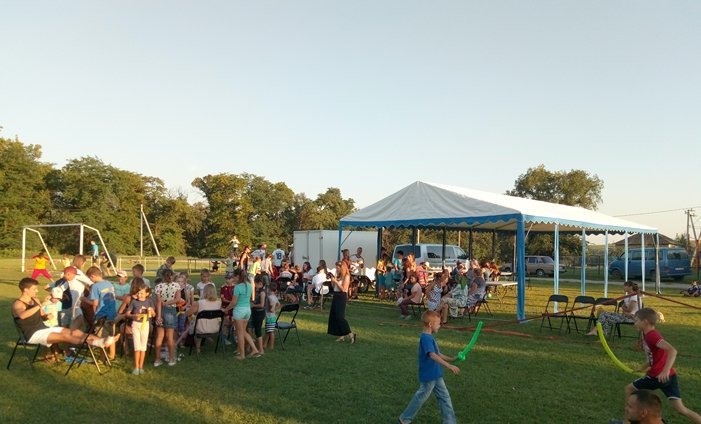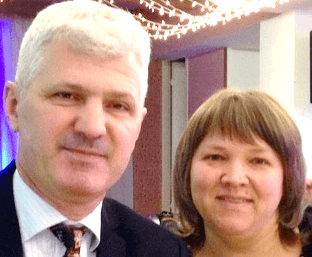
Outreach
What does Outreach look like in Moldova?
Moldova Mission Network Outreach Activities
In the Marriage Ministry/Family Ministry outreach Country Directors Slavic and Alla Verenciuc pursue, sharing the Gospel Message is an important part. The Alpha Program has found that many couples with little previous interest in Christianity discover the principles of The Marriage Course are so appealing that attending the course sparks curiosity about a faith journey.
In Moldova during the summer, Slavic and Alla are able to broaden their outreach to whole communities through their tent ministry, which takes place over the course of a weekend. Goals of the initiative are to have programs attractive to non-Christians, encourage Christians weak in their faith, and to help couples appreciate the role of faith in their life and in the life of their family, if they are parents.
For current information on Outreach and Evangelism efforts, see the newsletter updates in the News section of the website.
Outreach involves some functions most
people are unfamiliar with.
Only one of the four functions listed above is normally identified with Outreach: evangelistic efforts. This one is illustrated in 2 Timothy 4 “preach the message, to insist upon proclaiming it (whether the time is right or not), to convince, reproach, and encourage, as you teach with all patience.”
However, there are three other functions.
The second is Bring Back (Go After) The Strays; those who just dropped out of church. How often does a church take notice of a member who used to be active and regular in worship after they have disappeared? It is a Christian duty to count the 99, and go look for the 100th.
“What do you think a man does who has one hundred sheep and one of them gets lost? He will leave the other ninety-nine grazing on the hillside and go and look for the lost sheep. When he finds it, I tell you, he feels far happier over this one sheep than over the ninety-nine that did not get lost. In just the same way your Father in heaven does not want any of these little ones to be lost.”Matthew 18:12 – 14
It is sad. Sometimes they have been wounded or insulted unintentionally, and just a friendly face with an apology is all that is necessary. It takes little effort to do this, if we remember God has put them in our care.
The third function is Strengthen the Spiritually Weak. This involves being attentive to what the Bible teaches. Discipling members, making sure that every member is “rooted and built up in Christ and established in the faith.” (Colossians 2:7). Ephesian 4 teaches that the main purpose of the church is “to equip the saints for the work of ministry, (Ephesian 4:12).
Finally, Outreach includes Taking Care of The Sick Or Bandage The Injured. This seems rather complicated, and we immediately think of hospitals or doctors. Historical Christians have established medical missions for over 1,800 years. Some of the first recorded are in 500AD by Origen, and Eusebius of Caesarea h-century pioneer work giving a chronological account of the development of Early Christianity from the 1st century to the 4th century. St. Paul orders “Bear one another’s burdens, and so fulfill the law of Christ.” (Galatians 6:2). And from the Old Testament, “The weak you have not strengthened, the sick you have not healed, the crippled you have not bound up, the strayed you have not brought back, the lost you have not sought” (Ezekiel 34:4).


“Dedication” is the single best word that describes the exceptional outreach ministry of Slavic & Ala Verenciuc. Both possess a strong desire to see Moldovans accept Jesus Christ as their Lord and Savior.
Slavic very much enjoys sharing the Gospel in villages with his tent ministry or teaching new believers about their rights and obligations as Christians.
To this couple, discipleship is considered as essential as food and sleep. They operate a Christian book store from their living room. Both teach Bible study classes. They enjoy counseling new believers in the faith. In their tent ministry, they bring a large tent onto a village green on Friday and set it up. To the residents, a tent means a circus or carnival.
On Saturday, Slavic, Ala, and their team have games and food for all ages. They sometimes bring in a Gypsy Christian choir to entertain the families. In the evening they invite the group to a meeting in the tent where Slavic presents the Gospel.
While Moldova is traditionally an Orthodox country, few attend church or have even heard the Gospel. The reaction is frequently, “We have never heard anything like this. We want to hear more.” They have that opportunity the next day, on Sunday.
Some of Slavic’s immediate family have immigrated to the USA. However, he is so determined to help Moldova, that he has decided to stay and work for the kingdom in his native country. Commitment & determination!
Religious beliefs in Moldova
Nominally Orthodox 90.1%
Born-Again Christian 2.6%
Agnostic 1%
Other 0.1%
Atheist 0.2%
Unspecified 6.9%.